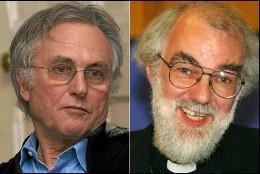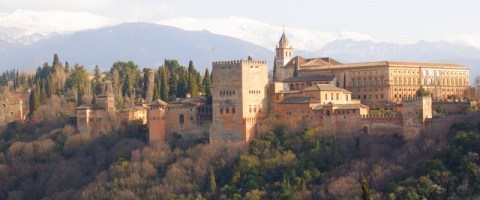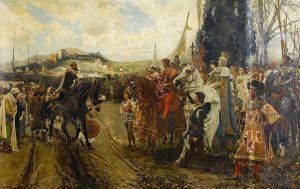Neil Rees's Blog: eatingwithsinners, page 10
March 6, 2012
“Statistics are like bikinis…

"Statistics are like bikinis…

March 1, 2012
Review: “The Reason For God: Belief In An Age Of Skepticism”

Review: "The Reason For God: Belief In An Age Of Skepticism"

The Reason For God: Belief In An Age Of Skepticism By Tim...

February 28, 2012
Happy are the poor / middling / filthy rich* (*delete as appropriate)

February 24, 2012
Dawkins, Williams and Pascal's Wager
 "Flight BA7102 with destination Sydney, Australia, is now ready for departure. We wish to advise all passengers that there is a 1.43% chance that this plane will experience fatal engine failure and crash en route. Please do not be alarmed, as this still gives the flight an acceptable 98.57% probability of arriving safely. We would thus invite our business class passengers, passengers with small children, and other passengers requiring assistance to commence boarding immediately via gate 27…"
"Flight BA7102 with destination Sydney, Australia, is now ready for departure. We wish to advise all passengers that there is a 1.43% chance that this plane will experience fatal engine failure and crash en route. Please do not be alarmed, as this still gives the flight an acceptable 98.57% probability of arriving safely. We would thus invite our business class passengers, passengers with small children, and other passengers requiring assistance to commence boarding immediately via gate 27…"
Would you board that flight? And if you were the pilot, would you pull away from the jetway with 400 passengers on board? Judging by yesterday's debate at Oxford University that, apparently, is what Prof. Richard Dawkins is asking us to do — not on an earthly journey but with regard to beliefs that relate to eternity and the existence of God.
Chaired by philosopher Sir Anthony Kenny, the debate on "The nature of human beings and the question of their ultimate origin" was streamed live and managed to generate a flurry of activity on Twitter as proponents of each side tossed arguments backwards and forwards. It is not very often that the #dawkinsarchbishop hashtag will be seen, much less in the top trending topics. Overall it was a respectful and disciplined affair, albeit a little predictable in its content and general direction of argumentation.
For myself, one of the more interesting themes looked at human "self-reflexive consciousness". The archbishop's contention that we are unlike other creatures in that we are able to engage in intellectual reflection on ourselves and our role and purpose in the universe is a powerful one, pointing to the image of God in humanity. Even Prof. Dawkins seemed to be stuck for words — or ideas — at that moment, finally acknowledging that it was indeed "deeply mysterious".
Whilst not as curious as Prof. Dawkins admitting to having found himself singing a hymn in the shower that morning, what has most caught the public eye is the confession from "the world's most famous atheist" that he prefers to think of himself as an agnostic. Why? Because he cannot be certain that God does not exist. "I think the probability of a supernatural creator existing is very, very low," he said. And just how low is low? I am not sure how he was able to arrive at a figure for this, but he did; apparently he is "6.9 out of 7" certain of his beliefs. In other words, or numbers, 98.57%.
98.57% certain that we are the product of pure chance, that there is no creator, and that we are thus not morally responsible to anyone outside of this world. 98.57% that we do not need to worry ourselves with such issues and should simply get on with the job of making the best that we can in this purely material world in which we live. And just 1.43% that the answer to the question "Is there anyone out there?" is, in fact, affirmative.
Now, 98.57% are pretty good odds for most undertakings. With that chance of winning I think that even I might buy tickets for the UK National Lottery — an institution wonderfully described by Lancashire poet Les Barker as "not a prize I don't win, but a tax I don't have to pay". But are these odds you would be prepared to bet your life on? And your eternal future?
Blaise Pascal, the seventeenth century French mathematician and philosopher, might have had something to say about that. When faced with the question of the existence or not of God, impenetrable to human reasoning alone, he proposed his famous wager or gambit:
"'God is, or He is not.' But to which side shall we incline? Reason can decide nothing here. There is an infinite chaos which separated us. A game is being played at the extremity of this infinite distance where heads or tails will turn up. What will you wager? [...]
Let us weigh the gain and the loss in wagering that God is. Let us estimate these two chances. If you gain, you gain all; if you lose, you lose nothing. Wager, then, without hesitation that He is." (Blaise Pascal, Pensées Nº 233, available at Project Gutenberg, http://www.gutenberg.org/files/18269/18269-h/18269-h.htm).
 Evidently, it is not quite as simple as that, as if we could generate faith "just in case". But he has a point. To reject the notion of God even on a 98.57% probability is not the best way to face a potential eternity. Even if God "probably does not exist", if I were you, Mr. Dawkins, I'd like a higher probability before betting my all and inducing others to do the same.
Evidently, it is not quite as simple as that, as if we could generate faith "just in case". But he has a point. To reject the notion of God even on a 98.57% probability is not the best way to face a potential eternity. Even if God "probably does not exist", if I were you, Mr. Dawkins, I'd like a higher probability before betting my all and inducing others to do the same.








February 21, 2012
"El Suspiro del Moro" (The Moor's Sigh)
 I spent this last weekend in Granada, a city steeped in history. Not that visiting with two fifteen year olds is particularly conducive to the appreciation of history… But Granada – it was here that the Nasrid dynasty built the Alhambra palace and survived for over two centuries as the last bastion of Muslim Spain. Civil war internally, and pressure from "Christian" forces externally, finally led to the surrender of the city in November 1492, thus ending nearly eight centuries of Muslim presence and rule in the Iberian peninsula.
I spent this last weekend in Granada, a city steeped in history. Not that visiting with two fifteen year olds is particularly conducive to the appreciation of history… But Granada – it was here that the Nasrid dynasty built the Alhambra palace and survived for over two centuries as the last bastion of Muslim Spain. Civil war internally, and pressure from "Christian" forces externally, finally led to the surrender of the city in November 1492, thus ending nearly eight centuries of Muslim presence and rule in the Iberian peninsula.
 Having handed the keys of the city to Ferdinand II of Aragon and Isabella I of Castille, Boabdil, the last Nasrid emir, headed south towards the coast. The path wound up and away from the fertile plains of the Genil river into the Alpujarra hills, the foothills of the Sierra Nevada that lie between Granada and the Mediterranean. After riding for twelve kilometres with his back to the city, he turned for a final glimpse of his cherished Alhambra and broke down in tears, sobbing "Allahu Akbar" (God is great) in resignation to his fate.
Having handed the keys of the city to Ferdinand II of Aragon and Isabella I of Castille, Boabdil, the last Nasrid emir, headed south towards the coast. The path wound up and away from the fertile plains of the Genil river into the Alpujarra hills, the foothills of the Sierra Nevada that lie between Granada and the Mediterranean. After riding for twelve kilometres with his back to the city, he turned for a final glimpse of his cherished Alhambra and broke down in tears, sobbing "Allahu Akbar" (God is great) in resignation to his fate.  His mother's retort figures amongst the most famous in Spanish history: "Weep, weep like a woman for what you failed to defend like a man". The Al Badul pass where he broke down and that would forever hide Granada from his view now finds its identity in that event, being known in Spain as "El Suspiro del Moro", The Moor's Sigh.
His mother's retort figures amongst the most famous in Spanish history: "Weep, weep like a woman for what you failed to defend like a man". The Al Badul pass where he broke down and that would forever hide Granada from his view now finds its identity in that event, being known in Spain as "El Suspiro del Moro", The Moor's Sigh.
Christian monarchs and Muslim emirs, Spanish Catholics and Moorish followers of the prophet Muhammad. This was not just another conquest, another battle won, another city possessed.  Two civilizations had collided; the wa-la ghaliba illa-Llah of the Nasrids – "there is no victor but Allah" – had given way to the Te Deum and "Santiago, Santiago" of the new occupants. (Santiago, the patron saint of Spain, is popularly known as Santiago Matamoros, Saint James the Moorslayer. His help was in constant demand during the centuries of reconquest, and, if legend is held to be true, on more than one occasion he was happy to oblige and make an appearance on his white horse to personally despatch a few thousand of the infidels…)
Two civilizations had collided; the wa-la ghaliba illa-Llah of the Nasrids – "there is no victor but Allah" – had given way to the Te Deum and "Santiago, Santiago" of the new occupants. (Santiago, the patron saint of Spain, is popularly known as Santiago Matamoros, Saint James the Moorslayer. His help was in constant demand during the centuries of reconquest, and, if legend is held to be true, on more than one occasion he was happy to oblige and make an appearance on his white horse to personally despatch a few thousand of the infidels…)
Conflict does not just happen because of religion — the reconquest had witnessed plenty of fighting within both the Christian and Muslim camps as well as cross-religious alliances against common enemies, of whichever faith. However, religion certainly helps to create a deep-seated sense of identity and belonging that can also fuel mistrust and antagonism of "the other". For there is nothing like "otherness" to feed the flames of fear and hatred that contribute to conflict and emphasize the lines of separation between communities. When we understand a nation to be "a group of persons united by a common error about their ancestry and a common dislike of their neighbours" (attributed to Karl Deutsch), religion becomes a powerful element in the creation and defence of perceived ethnicity.
This is what makes conversion such a touchy subject even today. To be Spanish – until very recently at least – was to be Catholic, albeit in name only; you are not expected to be practicing, or even to believe everything that the catechism says you are supposed to believe. It is a cultural construct, a national sense of belonging, rather than a personal faith or practice. To be Moroccan is to be Muslim, Sunni Muslim at that. After the wave of deportations in 2010 aimed at those who were perceived as a threat to national stability because of their "proselytizing" activities, the debate there about religion and national identity continues.
Whenever embracing the message of the gospel involves taking on a cultural identity not shared by the community, the potential for conflict exists; where a declaration of faith is identified with a foreign power, conflict is virtually guaranteed. Two notions follow on from these statements.
Firstly, it is vital that conversion be to Christ, not to "Christian culture". Somehow, the peoples of the world need to have the chance to believe in Christ and then express that faith within their own cultural framework, whether African community awareness, Confucian filial piety or Western postmodernism. As any missiologist will confirm, separating "the gospel" from the cultural trappings with which it has become associated is not simple, but the inherent difficulty in no way removes the obligation. Then, just as the person of Christ must be central in proclamation, the person of the Holy Spirit must be trusted in the formation of Christian communities. In the West we tend towards cultural blindness to the syncretism of the Semitic gospel with Greek philosophical thought that produced Western theology. We are thus loathe to allow others the same freedom to explore creative understandings of eternal realities, being very quick to label as "heresy" anything that does not square with our own definitions and deductions. Both ecclesiology and theology need to be given the space to reflect local realities.
Secondly, the sooner the gospel is freed from identification with the West, the better. As long as Christianity is perceived as a Western religion then in many parts of the world conversion will remain an act of treason, a public political statement as much as a personal religious choice. We hear much about martyrdom and persecution in the Roman Empire, finally brought to an end by the conversion of Constantine at the beginning of the fourth century. We hear less about the effects of this event on the then flourishing Christian communities in the Parthian Empire, Rome's eastern neighbour and sworn enemy. Overnight, Christians became labelled as potential fifth columnists; the ensuing persecutions were massive and bloody, claiming many, many more lives than were ever lost under Roman emperors.
This imperative need for the de-Westernization of Christianity – in the eyes of the watching world, for statistically we are already there, and have been for a good few years – is the one consolation I draw from the progressive secularization of the West. If the conscious and deliberate moving away from their Judeo-Christian heritage that seems to have Western nations under its grip at present, together with the impressive growth of the non-Western churches, can contribute to the realisation that Christianity is not a Western faith, I for one will be happy.








February 13, 2012
"Three Sixteen"

Tim Tebow with his John 3:16 eye paint
(I wrote this last month, but thought it was not so out of date as to not be worth posting.)
Tim Tebow's name (no, I'd never heard of him either!) came in as numbers two and three in the ranking of the top three searches on Google on Monday January 9th, beaten only by the phrase that had become associated with him during the previous day's American football game as the young quarterback led the Denver Broncos to victory – John 3:16. Tebow's brilliant 80 yard touchdown pass in the first play of extra time gave his underdog team the match, but it was only when game statistics started to emerge that the implications were seen.
You see, Tim Tebow had thrown passes a total of 316 yards. His completed passes numbered 10 out of 21, giving an average of 31.6 yards per completion. The opposing team got in on the act too – the Pittsburgh Steelers had possession of the ball for 31 minutes and 6 seconds. Stranger still, the match's TV rating on the American channel CBS peaked at 31.6… And of course, once all this hit the internet, it "went viral".
Tebow was no innocent bystander, as it were, during all this. He had already gone highly public with his faith, for example adding John 3:16 to his black eye paint as a younger player – now banned by , and repeatedly gives public thanks to God for the opportunities he has to be a role model of Christian belief in the midst of secular society for young Americans. The final whistle at this match saw him on his knees in prayer again.
"The gospel in football", as one Tweet described this event, had immediate knock-on effects. Quick to respond to the intense internet activity, the Billy Graham Evangelistic Association launched a special page on their own website at www.PeaceWithGod.net: "John 3:16 – What does it mean?". A week and 9,000 visits later, 170 people had "indicated a decision to follow Christ", hardly a reliable statistic, perhaps, but certainly a measure of the level of engagement around the theme. John 3:16 and "Tebow-mania" dominated the internet and sent many an American football fan scurrying for their Bibles, albeit via Google. Coincidence? God-ordained? The debate will no doubt continue for a good while yet, State-side at least.
Whatever we may feel about that, let's not get too kabbalistic. There is nothing magic about it. John 3:16 does provide a convenient jumping-off point to speak about who Jesus is and what he has done for us. However, whilst most certainly the most widely known verse in the Bible, there is a whole lot more to the gospel than this. John 3:16 without Luke 3:16 can remain in the realms of pure theory, a distant contemplation of God's action in Christ that never actually has any direct impact on a person's life. The love of God must indeed be believed. This faith, however, is not just as an act of mental assent but a dynamic living relationship that transforms our whole being. Access to the eternal life promised by John is not a bolt-on extra for our current mediocrity; it is a radical transformation at the hands of the one who comes to baptise us "with the Holy Spirit and fire".
A "baptism of fire" is a phrase usually reserved for an intense and often challenging initiation of some description. It might seem strange to want to apply this to the beginnings of a relationship with God through Jesus Christ – most of us prefer to think in terms of forgiveness, reconciliation, deliverance, or other eminently positive aspects of infant faith. But the good news of restoration of relationship with God is transmitted in the "See, I make all things new" of a life cleansed as by fire. And then it is in meaningful contact with the Holy Spirit that we grow in this new found life in Jesus, fresh green shoots appearing from the ash-cloaked soil of a life that quite simply can never be the same again.
The gospel is real. The love of God is real. It's not just a divine lottery number to be scrawled on intriguing placards for the Olympic Games. It's Luke 3:16 as well as John.
PS – Yes, I guess you could take a look at some of the Bible's other 3:16s and see what you come up with, but please don't take yourself too seriously, particularly when you get to Leviticus 3:16…








February 9, 2012
Following an elephant into the blogosphere
Someone said they thought "Posterous" was a better platform than Blogger or WordPress… But then I read the recommendations my friend Steve (http://voiceinthedesert.org.uk/weblog...) gave on themes for WordPress.
So, whilst always one for the novel approach to life, in this instance I prefer to follow the well worn path of an experienced blogger than launch out on the back of what the elusive "someone" may have said. As the Ga proverb rightly observes: "Kë onyië shuö sëë lë owuuu bö." – if you follow in the trail of an elephant, you do not get smeared with the dew.
I think I'll take the dry route :-)
But that's all I am going to manage for today. More will follow, I trust at some unspecified future point. No promises though…








eatingwithsinners
- Neil Rees's profile
- 5 followers



